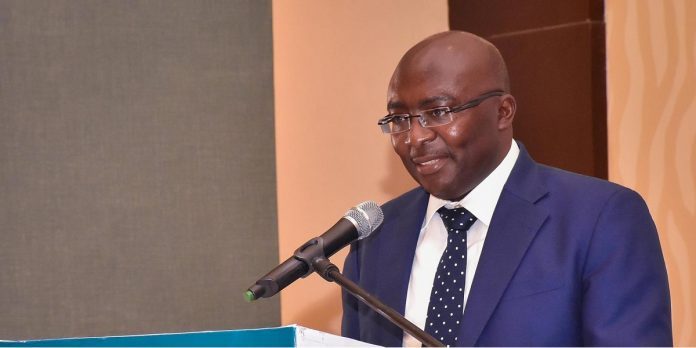Vice President Dr Mahamudu Bawumia on Wednesday said significant progress has been made towards the pilot implementation of the Cylinder Recirculation Model under the National Liquefied Petroleum Gas (LPG) Promotion Policy.
He said the Policy sought to ensure that LPG consumers have access to safe, efficient, affordable and environmentally-friendly LPG for commercial, industrial and domestic use by 2030.
The National Petroleum Authority (NPA) says the Ghana Cylinder Manufacturing Company is producing 37,000 cylinders needed for the pilot project in October this year, in Obuasi in the Ashanti Region and Kwaebibirim in the Denkyemboa District of the Eastern Region.
Dr Bawumia assured of government’s commitment to continue implementing policies and programmes to protect the safety and interests of Ghanaians.
Vice President Bawumia announced this at the opening of the third edition of the Ghana International Petroleum Conference (GhipCon) in Accra on Wednesday, held on the theme,” Regional Collaboration: A Catalyst for Transformation”.
The conference was organised by the Ministry of Energy and National Petroleum Authority in collaboration with the Chamber of Bulk Oil Distributors, which attracted petroleum experts, policy-makers, business men and women and captains of industry in the sub-region.
It is designed to actively bring to the fore the operating industry’s perspectives and guidance on issues of governmental and regulatory policy as well as best practices for the advancement of the petroleum downstream sector across the West African sub-region.
It will also afford stakeholders in the petroleum downstream industry in West African sub-region, to harmonise their policies and explore opportunities to allow the industry to respond to global development and trends consistent with member countries’ interests and aid in their economic transformation.
Some topics outlined for discussion include; Unlocking West Africa’s Deregulatory Inertia, Making West Africa’s Refineries Work, Ghana’s Cylinder Recirculation Model, Harmonising Sub-regional Petroleum Products Specifications and Challenges of Regional Distribution of Petroleum Products.
The Vice President said government was in the process of ensuring institutional and regulatory re-alignment of the midstream gas sub-sector to bring clarity and a degree of certainty to players in the industry.
In that regard, he said, the Energy Minister would soon finalise re-alignment and commence legislative consolidation of the Gas Master Plan into a Gas Act, which was an important requirement for development of Ghana into a petrochemical hub in the West African sub-region.
He said the proposed Gas Act would provide an enabling environment and appropriate incentives for investors and assured of government’s resolve to make the security of gas supply as feedstock for petrochemical plans a priority.
He said procurement of natural gas from domestic sources had been secured under regulation governing domestic supply obligation of upstream gas producers.
He, therefore, urged investors to take advantage of the favourable petroleum market environment in Ghana to invest in infrastructure such as oil jetties, pipelines and distribution facilities, as well as refineries, gas processing plants and storage and loading gantries.
Following the deregulation of the petroleum downstream sector in Ghana, Dr Bawumia said the sector had witnessed significant investment and expansion of petroleum products and outlets facilities.
He gave the assurance that government would continue to create an enabling environment for petroleum downstream sector to thrive competitively, efficiently and with the highest safety standards.
He said the investment had been championed by the private sector with growing number of indigenous Ghanaian companies, given rise to new entrants licensed to operate as petroleum service providers with over 250 licensed operators across the value chain and more than 15 licensed categories providing support services.
Over the past eight years, he said bulk distribution companies had grown from eight to 35, with oil marketing companies (OMCs) increased from 81 to 115 and 19 companies currently providing support services in areas like tank calibration, underground storage and above storage cleaning and non-destructive testing.
“As a country, our vision for the petroleum downstream industry is to ensure that Ghana becomes a key player in the downstream petroleum industry in the West African sub-region.
“To this end, government is also working on Petroleum Transportation Infrastructure Master Plan aimed at enhancing the pace of infrastructure sourcing with a regional context in mind,” he added.
Vice President Bawumia said the Plan would facilitate the demand of an alternative transportation infrastructure for petroleum products such as railway lines, pipelines and river badges to major demand centres across the country and link the sub-regional markets to further deepen the regional integration agenda.
Source: GNA

